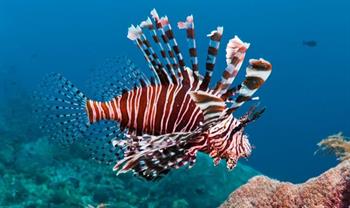


Living in reef systems, Pterois spp are voracious predators of small fish, particularly Damselfishes. Lionfish feed most actively from 7:00-11:00 am, and decrease feeding throughout the afternoon It breeds all-year round and has few natural predators in Antiguan waters. Its juveniles are pelagic, allowing they species to rapidly colonise new sites over great distances.
The following have been known to predate on Lionfish, but the extent of which is unknown: Moray eels (family Muraenidae), large groupers e.g.Nassau grouper (Epinephelus striatus).
There are 2 putative species found in the area: P. volitans (red Lionfish) from the central and West Pacific and Western Australia, and P. miles (Common Lionfish) from the remainder of the Indian Ocean. Atlhough both species are found in the Greater Caribbean. P. miles is far rarer.
RED LIONFISH MIGHT NOT BE WHAT WE THOUGHT!
Interestingly, new genetic analysis (Wilcox et al Journal of Heredity Jun 2017) indicates that the "Red Lionfish" is actually a hybrid!! (Of P. miles and another species, Russell's Lionfish P. russeleii)..there is a (unproven) suggestion that "hybrid vigour" (heterosis) may be a reason for their success ...
https://www.ncbi.nlm.nih.gov/pubmed/28637254
These can be distinguished by DNA testing, and also morphologically on the basis of the following four overlapping characteristics:
1. P.volitans has an modal number of 11 soft dorsal rays, while P. miles has 10:
2. P.volitans has a modal number of 7 soft anal rays, while P. miles has 6:
3. P. volitans has a longer pectoral fin than P. miles;
4. Spots on the soft dorsal fin are larger in P. volitans than in P. miles.
Although venomous, this fish is not poisonous and makes for good eating. In Antigua it is permissable to take this species with pole spears and the Antigua Conservation Society, in conjunction with some Dive Schools organises mas hunts, often in the form of a light-hearted competition. Even with aggressive hunting/ removal of this fish, there is no prospect of eliminating it from Antiguan reefs (due to rapid recolonisation), but controlling numbers will help relieve the pressure and impact upon the reef biotope.
More on Lionfish HERE
The following have been known to predate on Lionfish, but the extent of which is unknown: Moray eels (family Muraenidae), large groupers e.g.Nassau grouper (Epinephelus striatus).
There are 2 putative species found in the area: P. volitans (red Lionfish) from the central and West Pacific and Western Australia, and P. miles (Common Lionfish) from the remainder of the Indian Ocean. Atlhough both species are found in the Greater Caribbean. P. miles is far rarer.
RED LIONFISH MIGHT NOT BE WHAT WE THOUGHT!
Interestingly, new genetic analysis (Wilcox et al Journal of Heredity Jun 2017) indicates that the "Red Lionfish" is actually a hybrid!! (Of P. miles and another species, Russell's Lionfish P. russeleii)..there is a (unproven) suggestion that "hybrid vigour" (heterosis) may be a reason for their success ...
https://www.ncbi.nlm.nih.gov/pubmed/28637254
These can be distinguished by DNA testing, and also morphologically on the basis of the following four overlapping characteristics:
1. P.volitans has an modal number of 11 soft dorsal rays, while P. miles has 10:
2. P.volitans has a modal number of 7 soft anal rays, while P. miles has 6:
3. P. volitans has a longer pectoral fin than P. miles;
4. Spots on the soft dorsal fin are larger in P. volitans than in P. miles.
Although venomous, this fish is not poisonous and makes for good eating. In Antigua it is permissable to take this species with pole spears and the Antigua Conservation Society, in conjunction with some Dive Schools organises mas hunts, often in the form of a light-hearted competition. Even with aggressive hunting/ removal of this fish, there is no prospect of eliminating it from Antiguan reefs (due to rapid recolonisation), but controlling numbers will help relieve the pressure and impact upon the reef biotope.
More on Lionfish HERE
Click image for larger size
